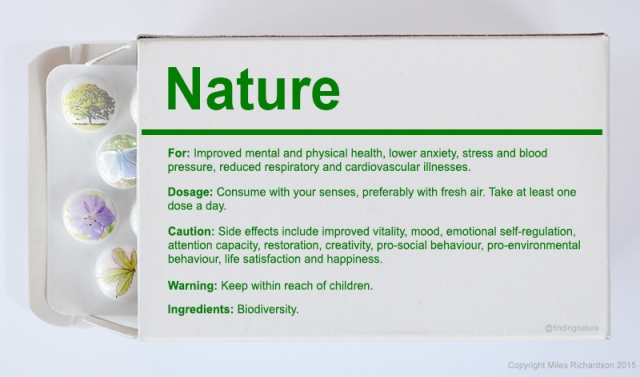Back in March 2015, after a ‘Towards a Daily Dose of Nature’ event during a Nature & Wellbeing Summit in Bristol, I introduced the concept of nature as a ‘dose of nature’ through a graphic depicting ‘nature pills’. This was an exercise to encapsulate the vast benefits of nature on health and wellbeing in a format familiar to many – the drug packet. The idea was compelling; nature, with all its health benefits and positive ‘side effects’, seemed like it should be flying off the shelves. The image went a little viral, but I soon decided to stop using it. Why? Because nature is not a commodity to be consumed at our convenience; it’s not merely an adjunct to our wellbeing but rather a foundation upon which our wellbeing rests.

Copyright Miles Richardson 2015
Nature’s Role in Wellbeing: More Than Just a Dose
The notion of a ‘dose of nature’ frames nature much like any other consumable resource – something to be taken in measured amounts for human benefit. However, this perspective can diminish the profound, intrinsic connection we have with the natural world. Nature isn’t just beneficial for health in isolated “doses”; it’s fundamental to our existence and wellbeing. Nature connection isn’t a part-time relationship.
Connection to nature isn’t just about the frequency of visits or the time spent; it’s about fostering a deep, ongoing relationship. Nature manages our emotions, teaches resilience, and offers a space for reflection and recovery from life’s stresses. For instance, the compassion that comes from virtually embodying nature or the emotional regulation facilitated by being with nature speaks to a connection that transcends the transactional nature of a “dose”.
Reframing Nature’s Role in Healthcare
The biopsychosocial model, as proposed by Engel in 1977, was revolutionary in acknowledging the role of psychological and social factors alongside biological ones in health. However, it’s time to expand this model further so that it reflects the integral role nature plays in our health. Such a one health model suggests that our wellbeing is not just influenced by biology and psychology but is deeply intertwined with our connection to the natural world.
Healthcare models, particularly the biomedical approach, often treat health as merely the absence of disease, focusing on treatment rather than prevention or wellness. But integrating nature into health isn’t just about simply prescribing it like a medication; it’s about normalising nature in our daily lives – but perhaps nature prescriptions can be part of that. If so, it’s important to create a situation where nature is a core component of health education, policy, practice and daily living. This means to including nature’s role in medical training, promoting urban planning that prioritises green environments, and encouraging lifestyles where nature is not an escape but an integral part of our days.
This connection with nature isn’t just for personal wellbeing, it is also essential for sustainable living, where human and environmental health are seen as interdependent. We must move away from the idea of nature as a resource for wellbeing to understanding it as a basic need, akin to nutrition or social connections.
Writing this blog has left me feeling somewhat torn, we must tell the story of nature’s profound impact on our lives in ways that grab attention, while ensuring nature isn’t seen as just another option. It is our origin, our wellbeing, and our future. Rather than reduce it to a pill, better to elevate it to a pillar of health and life.